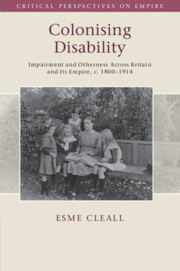Book contents
- Colonising Disability
- Critical Perspectives on Empire
- Colonising Disability
- Copyright page
- Dedication
- Contents
- Tables
- Acknowledgements
- Introduction
- 1 Disability and Otherness in the British Empire
- 2 Saving the Other at Home and Overseas
- 3 ‘A Fearfully and Wonderfully Made Individual’
- 4 Signs of Humanity
- 5 A Deaf Imaginary
- 6 Immigration
- 7 The Health of the Nation
- 8 Conclusion
- Bibliography
- Index
2 - Saving the Other at Home and Overseas
Philanthropy, Education and the State
Published online by Cambridge University Press: 21 July 2022
- Colonising Disability
- Critical Perspectives on Empire
- Colonising Disability
- Copyright page
- Dedication
- Contents
- Tables
- Acknowledgements
- Introduction
- 1 Disability and Otherness in the British Empire
- 2 Saving the Other at Home and Overseas
- 3 ‘A Fearfully and Wonderfully Made Individual’
- 4 Signs of Humanity
- 5 A Deaf Imaginary
- 6 Immigration
- 7 The Health of the Nation
- 8 Conclusion
- Bibliography
- Index
Summary
One consequence of the increased enumeration of disabled people and their constitution as pitiable, was the imperative to ‘save’ them from physical destitution and spiritual damnation. Co-currently, from the late eighteenth century onwards a series of intellectual and pedagogical developments meant that helping or ‘civilising’ certain disabled populations, started to be seen as possible. Philanthropists, educationalists, religious figures and, later, government officials, declared they could ‘save’ disabled people and advocated new techniques and instruments to do so. Like the racialised others of empire, disabled people were deemed incapable of helping themselves and dependent on white, non-disabled people. Taking different geographical frames, this chapter tracks these developments in thinking about the development of ‘special’ education, the development of philanthropic work and the increasing role of the state. I make several arguments. First that developments in education were linked to the wider ‘civilising project’. Secondly, that the opening of schools and institutions, whilst uneven and sporadic were based on networks of knowledge that facilitated the transcolonial exchange of information. And thirdly that the discrepant development of institutions across different colonial locations also reflected racialised forms of knowledge about the people who lived there.
Keywords
- Type
- Chapter
- Information
- Colonising DisabilityImpairment and Otherness Across Britain and Its Empire, c. 1800–1914, pp. 62 - 92Publisher: Cambridge University PressPrint publication year: 2022

